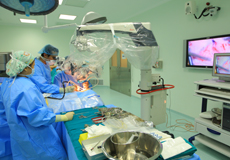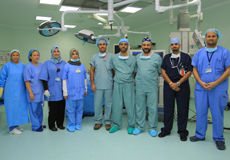Step I. Referral to KAMC Cochlear Implant Program
-
 Referrals should be directed to the Program
Director or his designee. Once accepted, they will be seen by Audiologists, Speech – Language
Pathologists and Physicians.
Referrals should be directed to the Program
Director or his designee. Once accepted, they will be seen by Audiologists, Speech – Language
Pathologists and Physicians.
-
Patients above 18 years old will be assessed by Otologist and patients equal or under the age of 18 years
old will be assessed by Pediatric Otolaryngologists. Each case will be considered on an individual
basis.
-
The patient must have a moderately severe to profound hearing loss which can not be helped adequately by
hearing aids.
-
The patient must be willing and able to attend the KAMC for several assessment appointments before the
operation as well as all the necessary programming and rehabilitation sessions after the operation.
-
The referring clinician will be kept informed of a patient’s progress.
A written acknowledgement of the referral will be sent with an information pack for
new referrers. Written reports will be sent at all stages of the pre-operative assessment following surgery,
following initial device fitting and following post-operative reviews.
Step II. Stage One Assessments
A. Medical Evaluation
-
The patient will be seen by the CI surgeon at the first appointment.
-
If the patient is suitable for cochlear implant assessment the CI surgeon arranges a CT scan and MRI at
this stage. In cases of meningitis, a repeat scan will be performed close to the operation.
B. Audiological Evaluation/Hearing Aid Evaluation
The audiological evaluation includes:
-
Pure tone audiogram.
-
Adequate fitting of hearing aids binaurally if possible.
-
Hearing aid trial if appropriate.
-
Threshold ABR.
-
Aided audiogram after final hearing aid fitting.
-
Preliminary speech tests as soon as the patient is replaced with a Hearing Aid.
C. The patient is seen by the Cochlear Implant Coordinator for counseling. Counseling at stage 1
involves:
-
History taking.
-
Explanation of cochlear implant assessments.
-
Explanation of surgical procedure.
-
Dummy implant and external devices shown.
-
Explanation of how the implant works.
-
KAMC cochlear implant information folder issued.
D. Speech and Language Evaluation
On completion of stage one assessment, the patient will be discussed at a Cochlear Implant Team Meeting and test
results approved before proceeding to stage two assessments.
Sponsorship (NON SANG) should be applied for if the patient proceeds to stage II
assessments.
Step III. Stage Two Assessments
-
An electrical stimulation test will be carried out for patients who had no auditory threshold response at
2KHZ (if possible). The ENT Surgeon places the electrodes and the cochlear implant audiologist performs
the test. Ear canal stimulation will be carried out first and, if there is no response, then the ENT
Surgeon may decide to perform promontory stimulation test.
-
 The pediatric psychologist and
pediatric development and behavior will see the patient at this stage to be arranged by the coordinator.
A family member will be asked to attend this appointment. Both clinicians will send a report to the CI
Surgeon and the Coordinator making recommendations regarding the patient’s ability to cope with
implantation and rehabilitation.
The pediatric psychologist and
pediatric development and behavior will see the patient at this stage to be arranged by the coordinator.
A family member will be asked to attend this appointment. Both clinicians will send a report to the CI
Surgeon and the Coordinator making recommendations regarding the patient’s ability to cope with
implantation and rehabilitation.
-
The patient is seen by the Cochlear Implant Coordinator for counseling. Counseling at stage 2 involves:
-
When a patient completes any stage of the assessment program, their case is discussed at the next
Cochlear Implant Team meeting, which is held once a month. A decision will be made at team meeting
whether a patient will proceed on to the next stage of the assessment program. Decisions will also be
made to carry out additional assessments / tests when necessary.
-
After stage two assessments, a decision will be made whether to set a date for the surgery or to proceed
with the suitable solution for the patient’s condition.
Step IV. Stage Three Assessments
-
An evaluation of the patient’s speech and communication skills is carried out by the Speech and Language
Pathologist. A video recording of standard conversation is made. A report is filed. If required a speech
therapy program is set up post implantation
-
Standardized speech perception tests are carried out.
-
Final pre-surgical counseling is carried out by the Cochlear Implant Audiologist or SLP. This includes :
-
The patient is offered the opportunity to meet an implanted patient with similar age and hearing loss if
possible.
-
The patient is seen in the clinic by the CI Surgeon and Cochlear Implant Coordinator prior to surgery.
Step V. Surgical
-
The CI surgeon will perform the cochlear implant surgery.
-
The cochlear implant audiologist will attend the surgery to perform telemetry measurements.
-
The cochlear implant coordinator is responsible for ensuring that all relevant equipment is available and
ready for use on the day of surgery. He/she will also coordinate observers, make video recording and
complete documentation
-
Facial nerve monitoring will be carried out for all cochlear implant operations.
Page Content
Everything related to the Pre-Operative Procedures for the cochlear implant